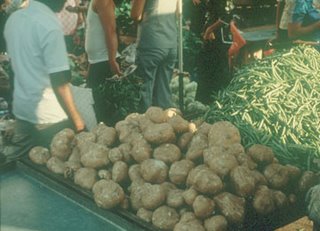I toiled in restaurants for a handful of years after college for which I was provided just enough income to support the debauched lifestyle that it promoted -- a happy circumstance that capitalism seems especially well-suited to foster. Among my misfit compatriots was Elmer, a teenage El Salvadoran dishwasher. It was a subject of some debate whether Elmer expressed any emotion at all. If he did, it could only be characterized as disinterested depression.
One afternoon, on a whim, I ordered a jicama, sometimes referred to as a Mexican radish or yam bean root. The jicama is an unsightly beige colored fibrous tuber often described as an overgrown water chestnut. There is nothing sexy about the jicama, except perhaps that it apparently hails from the morning glory family, which, depending on your intimacy with the morning glory seed and some of its lesser known properties, may or may not rise to the level of sexy. Nor is there anything inherently comforting or reassuring about the jicama. It belongs to that class of food that is never described by its own qualities but rather as conglomeration of attributes drawn from other foods. "The skin of a Cuban potato," "the shade of ginger," "the flesh of a water chestnut," one would hardly be surprised to hear that it tastes like chicken, though it most certainly does not.

Elmer was putting away the produce order that afternoon and came upon the jicama. An unfamiliar intensity of movement flashed in his corner of the kitchen. At first he was startled. Then he was determined. He reached out to the jicama like a world cup goalkeeper bringing a soccer ball securely to his chest. He arched his back and lifted his chin towards the ceiling. Waitresses stood silently clutching hot plates as they looked on in utter astonishment. "Heee ... caaa ... maaaa!" exulted Elmer. With homesick watery eyes he set to work. Within minutes he had butchered the homely tuber and seasoned it with salt and lime juice. His eyes closed. His body shuddered. He swallowed. A look of peace overcame him. Then with solemn pride he offered his treasure to each of us. We took our jicama communion with respect, but it did not speak to us. The angels did not sing.
For Elmer, it seems the jicama was more than a vegetable. It was a symbol. He tasted things we did not. The jicama sang his national anthem while performing shiatsu on his tongue.
My "jicama," I suppose, is a fresh baguette with a rich aroma and strong chew. I don't know what my children's "jicama" will be. I only pray it will not be branded by Frito Lay, Hostess or Nabisco.
4 comments:
Wow. Great post. Since I'm from Cincinnati, my jicama is Skyline Chili. Pedestrian, but I've never pretended to be otherwise.
harv
I loved Elmer. That jicama did wonders for him.
My jicama is a perfectly ripe sugar snap picked off the vine and eaten right there in the garden.
My jicama is a perfectly proportioned piece of pecan pie. With a little alliteration on the side.
What I mean is, some pecan pies have way too much filling. I want nuts all the way through. And no chocolate either, please.
And now, I return to wait eagerly for naked people. If I have to wait another day, the kids and I are going to start banging our cutlery on the kitchen table and begin to chant, "Naked People Naked People."
Great Post, Peter. John just turned me on to your blog, to which I will no doubt often return.
By the way, my jicama is tender swiss chard, steamed to a bright green and pink, then sauteed with olive oil, salt and chopped garlic.
Post a Comment